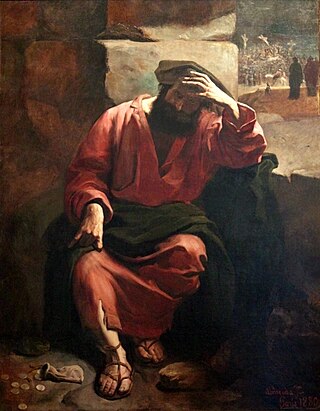
Judas Iscariot was, according to Christianity's four canonical gospels, one of the original Twelve Apostles of Jesus Christ. Judas betrayed Jesus to the Sanhedrin in the Garden of Gethsemane, in exchange for 30 pieces of silver, by kissing him on the cheek and addressing him as "master" to reveal his identity in the darkness to the crowd who had come to arrest him. In modern times, his name is often used synonymously with betrayal or treason.
The Sicarii were a group of Jewish Zealots, who, in the final decades of the Second Temple period, conducted a campaign of targeted assassinations and kidnappings of Roman officials in Judea and of Jews who collaborated with the Roman Empire. They later became known for a reported mass suicide at the Siege of Masada. The Sicarii carried sicae, or small daggers (sickles), concealed in their cloaks; at public gatherings, they pulled out these daggers to attack, blending into the crowd after the deed to escape detection.

The parable of the Good Samaritan is told by Jesus in the Gospel of Luke. It is about a traveler who is stripped of clothing, beaten, and left half dead alongside the road. A Jewish priest and then a Levite come by, both avoiding the man. A Samaritan happens upon him and, though Samaritans and Jews were generally antagonistic toward each other, helps him. Jesus tells the parable in response to a provocative question from a lawyer in the context of the Great Commandment: "And who is my neighbor?" The conclusion is that the neighbor figure in the parable is the one who shows mercy to their fellow man or woman.

Simon the Zealot, also the Canaanite or the Canaanean, was one of the apostles of Jesus. A few pseudepigraphical writings were connected to him, but Jerome does not include him in De viris illustribus written between 392 and 393 AD.
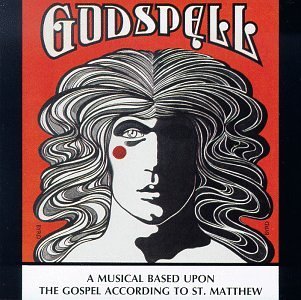
Godspell is a musical in two acts with music and lyrics by Stephen Schwartz and a book by John-Michael Tebelak. The show is structured as a series of parables, primarily based on the Gospel of Matthew, interspersed with music mostly set to lyrics from traditional hymns, with the passion of Christ appearing briefly near the end.

Jude was one of the Twelve Apostles of Jesus according to the New Testament. He is generally identified as Thaddeus and is also variously called Judas Thaddaeus, Jude Thaddaeus, Jude of James, or Lebbaeus. He is sometimes identified with Jude, the brother of Jesus, but is clearly distinguished from Judas Iscariot, the disciple who betrayed Jesus prior to his crucifixion. Catholic writer Michal Hunt suggests that Judas Thaddaeus became known as Jude after early translators of the New Testament from Greek into English sought to distinguish him from Judas Iscariot and subsequently abbreviated his forename. Most versions of the New Testament in languages other than English and French refer to Judas and Jude by the same name.
Judas of Galilee, or Judas of Gamala, was a Jewish leader who led resistance to the census imposed for Roman tax purposes by Quirinius in the Judaea Province in 6 CE. He encouraged Jews not to register, and those that did were targeted by his followers. He is credited with beginning the "fourth philosophy" which Josephus blames for the war with the Romans in 66–73. These events are discussed by Josephus in The Jewish War and in Antiquities of the Jews and mentioned in the Acts of the Apostles.
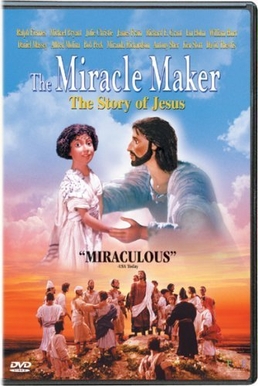
The Miracle Maker sometimes subtitled The Story of Jesus, is a 1999 Welsh-Russian stop motion-animated film directed by Derek Hayes and Stanislav Sokolov.
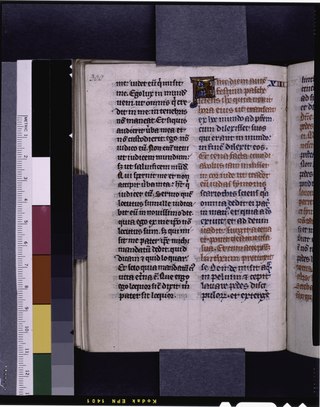
John 13 is the thirteenth chapter of the Gospel of John in the New Testament of the Christian Bible. The "latter half", "second book", or "closing part" of John's Gospel commences with this chapter. The nineteenth-century biblical commentator Alexander Maclaren calls it "the Holy of Holies of the New Testament" and the "most sacred part of the New Testament", as it begins John's record of the events on the last night before the crucifixion of Jesus Christ, emphasising Jesus' love for His disciples, demonstrated in the service of washing their feet, and His commandment that they love one another in the same way. The author of the book containing this chapter is anonymous, but early Christian tradition uniformly affirmed that John composed this Gospel.
"Son of Man" is a British television play by playwright Dennis Potter which was first broadcast on BBC1 on 16 April 1969, in The Wednesday Play slot. An alternative depiction of the last days of Jesus, Son of Man was directed by Gareth Davies and starred Northern Irish actor Colin Blakely. The play was shot on videotape over three days on a very limited budget: Potter was later to say that the set "looks as though it's trembling and about to fall down."

Irving Pichel was an American actor and film director, who won acclaim both as an actor and director in his Hollywood career.

The Last Days of Judas Iscariot is a play by American playwright Stephen Adly Guirgis first staged Off-Broadway at The Public Theater on March 2, 2005, directed by Philip Seymour Hoffman.

The commissioning of the Twelve Apostles is an episode in the ministry of Jesus that appears in all three Synoptic Gospels: Matthew 10:1–4, Mark 3:13–19 and Luke 6:12–16. It relates the initial selection of the Twelve Apostles among the disciples of Jesus.

Jesus predicts his betrayal three times in the New Testament, a narrative which is included in all four Canonical Gospels. This prediction takes place during the Last Supper in Matthew 26:24–25, Mark 14:18–21, Luke 22:21–23, and John 13:21–30.

In Christian theology and ecclesiology, the apostles, particularly the Twelve Apostles, were the primary disciples of Jesus according to the New Testament. During the life and ministry of Jesus in the 1st century AD, the apostles were his closest followers and became the primary teachers of the gospel message of Jesus. There is also an Eastern Christian tradition derived from the Gospel of Luke that there were seventy apostles during the time of Jesus' ministry.

The Calvary at Pleyben, dating from 1555, is located in the village of Pleyben in Brittany, northwestern France.

The Calvary at Plougonven is located within Brittany, France.

The names Simon and Simeon appear 71 times and 8 times in the New Testament, respectively. Simon was a very common given name in the historical period and region of Jesus, but surnames were still very rare. It is therefore not always clear which person these names refer to, and whether some refer to the same person or distinct characters, which has led to confusion. Therefore, Christian authors and modern scholars have given these men nicknames based on their known attributes.
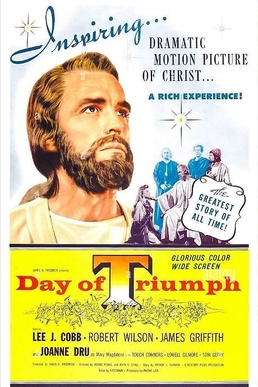
Day of Triumph is a 1954 American drama film directed by Irving Pichel and John T. Coyle, from a screenplay by Arthur T. Horman. The film stars Lee J. Cobb, Robert Wilson, James Griffith, and Joanne Dru.
















